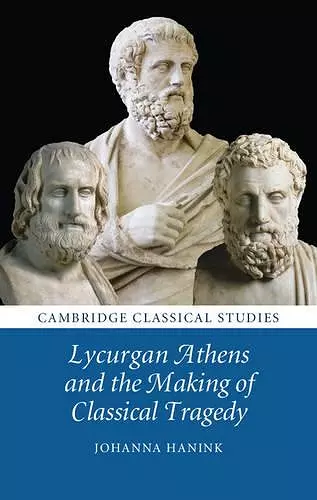Lycurgan Athens and the Making of Classical Tragedy
Format:Hardback
Publisher:Cambridge University Press
Published:19th Jun '14
Currently unavailable, and unfortunately no date known when it will be back
This hardback is available in another edition too:
- Paperback£30.99(9781107697508)

The first account of how Athens invented the notion of 'classical' tragedy during the later fourth century BC.
The Athenians themselves invented the notion of 'classical' tragedy just a few generations after the city's defeat in the Peloponnesian War. This study marks the first account of how Athens constructed its theatrical past and sheds new light upon the interaction between the city's literary and political history.Through a series of interdisciplinary studies this book argues that the Athenians themselves invented the notion of 'classical' tragedy just a few generations after the city's defeat in the Peloponnesian War. In the third quarter of the fourth century BC, and specifically during the 'Lycurgan Era' (338–322 BC), a number of measures were taken in Athens to affirm to the Greek world that the achievement of tragedy was owed to the unique character of the city. By means of rhetoric, architecture, inscriptions, statues, archives and even legislation, the 'classical' tragedians (Aeschylus, Sophocles and Euripides) and their plays came to be presented as both the products and vital embodiments of an idealised Athenian past. This study marks the first account of Athens' invention of its own theatrical heritage and sheds new light upon the interaction between the city's literary and political history.
'Hanink writes in a lucid and engaging style, bringing together the disparate evidential strands, archaeological, epigraphical and literary, into a persuasive synthesis, and handling deftly the balance and interplay between the political and literary aspects of her topic … the book makes a very valuable, well-rounded, contribution to our understanding of the literary, political and monumental aspects of post-fifth-century tragedy in general and its role in the Lycurgan policy agenda in particular; and the lively, well-crafted and accessible style in which it is written will make it attractive to teachers and students as well as useful to researchers.' Stephen Lambert, Bryn Mawr Classical Review
ISBN: 9781107062023
Dimensions: 222mm x 147mm x 20mm
Weight: 480g
292 pages